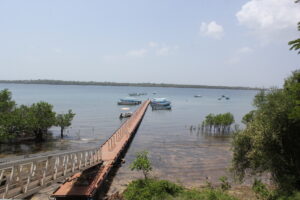BY SHABAN OMAR
Nearly 40 per cent of coral reefs along Kenya’s coastline suffered bleaching last year due to escalating climate change, according to Adan Kala, Senior Assistant Director of the Coast Conservation Area at the Kenya Wildlife Service.
Kala attributed the alarming coral bleaching to the intensifying impacts of regional and global warming, challenges that transcend local intervention.
He said the environmental crisis has had a profound ripple effect on marine ecosystems, including a massive decline in fish population, threatening livelihoods and biodiversity.
“Early last year, nearly 40 per cent of coral reefs were bleached due to the increasing effects of regional and global warming, a challenge that extends beyond local control,” he said.
Kala said that sea pollution from both liquid and solid waste remains a big obstacle to conservation efforts.
He noted that urban centres along the coastal region, including Mombasa, Shimoni, Watamu, Malindi, and others, have been huge contributors to waste pollution in the Indian Ocean.
Kala said the unchecked disposal of waste from towns is not only polluting marine habitats but also jeopardizing the health of coastal ecosystems and the communities that depend on them.
He said that overfishing and harmful human activities, both within marine national reserves and in open waters, have greatly amplified the effects of climate change on marine ecosystems.
Kala said the unsustainable practices have weakened the resilience of marine environments, making them more vulnerable to the devastating impacts of climate change.
He stressed that overfishing depletes fish stocks and also disrupts the balance of marine ecosystems.
The senior officer also expressed concern over the continued use of illegal fishing methods, which cause severe damage to marine life and ecosystems.
“Some individuals engage in harmful fishing activities, and the over-reliance on the same fishing grounds for prolonged periods has exacerbated the problem,” he said.
Kala said that the combination of unsustainable fishing practices, waste pollution, and climate change has created a perfect storm threatening the delicate balance of coastal ecosystems.
He spoke in an interview during the inception meeting and Tech4 Nature project launch at the Kisite Mpunguti Marine National Park and Reserve at Shimoni in Lunga-Lunga sub-county, Kwale County.
Kala urged local communities and stakeholders to adopt sustainable fishing methods, reduce pollution, and actively participate in marine conservation efforts to protect vital habitats.
“The health of our marine ecosystems is directly tied to the well-being of our communities. If we continue to harm our ocean, we risk losing not only biodiversity but also the livelihoods that depend on it,” he said.
He said protecting the ocean and environment is a shared responsibility and requires concerted efforts from everyone.
Kala urged fisherfolk to adhere to established fishing rules and regulations and to adopt approved, sustainable fishing methods.
He said fisherfolk could help protect fish populations, ensure long-term productivity, and support the health of marine habitats.
Kala also noted that cooperation between communities, conservation agencies, and local authorities is crucial to achieving the conservation goals.
“Let us all play our part in conserving the ocean. Responsible fishing today will secure the future of our marine resources for generations to come,” he said.


